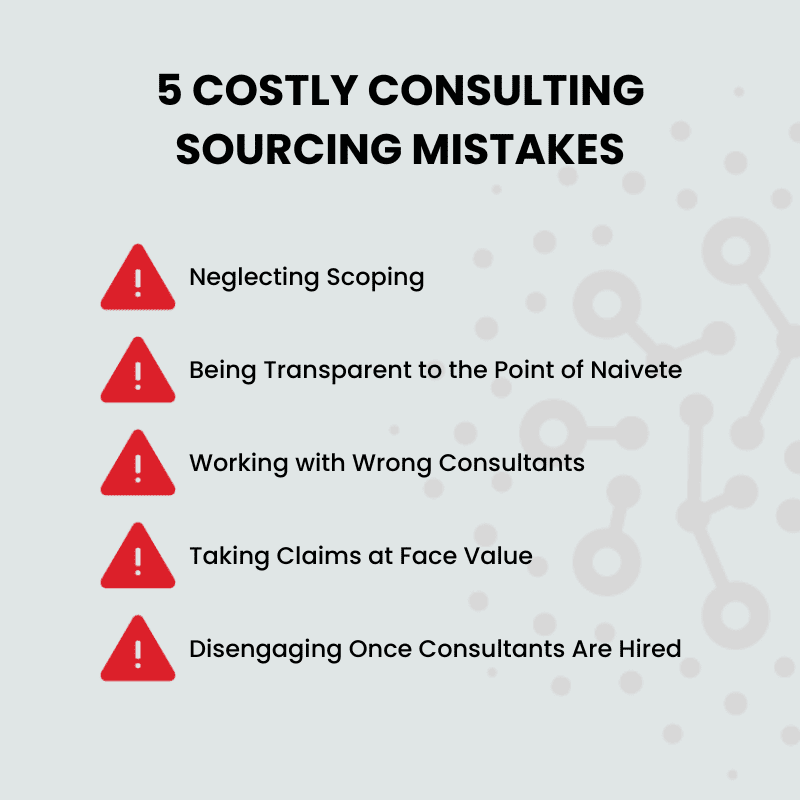Finding the perfect consulting firm for your needs can feel like searching for a needle in a haystack. The market’s exploding, set to grow from an already respectable $321.52 billion in 2023 to a whopping $395.14 billion by 2028, at a CAGR of 4.21%.. And with more consultants out there than ever, it’s not just about finding any consultant – it’s about finding the right one.
But let’s be honest, with so many options and so much complexity; it’s easy to trip up. A few wrong turns here and there, and your consulting sourcing process can turn into a wild goose chase. But hey, we’ve all been there. The key is to learn from those mistakes and make sure they don’t happen again.
So, to help you out, we’ve put together a list of the top 5 consulting sourcing mistakes you need to dodge. We’re talking about those common missteps that can take you off track, costing you time, money, and a whole lot of stress.
Our goal is to give you the heads-up you need to make smarter decisions, find the right consultants for your project, and enjoy the success you’re after. So, let’s jump right in!
#1. Neglecting Scoping: One of the Most Common Consulting Sourcing Mistakes
Don’t you hate it when you hire someone to do a job, but then you end up with something that doesn’t quite hit the mark? Yeah, that’s one of the biggest consulting sourcing mistakes – not being crystal clear about what you want right from the get-go.
It’s like getting super hyped about a consultant’s skills but then totally forgetting why you called them in the first place. End result? A project that’s like a shiny new toy that doesn’t quite fit the bill. And the worst part – you’ve spent time and money that you’re never getting back.
Consultants are like the cool kids in school; they absolutely love a well-drafted RFP. Why? Because figuring out what you want is kind of like doing their homework for them. And let’s be honest, no one likes extra work that doesn’t get graded (or, in their case, paid).
And if you think a murky scope of work just messes with the start, think again. It’s like that small stone in your shoe that keeps poking you – misunderstandings, disagreements over bills, not enough hands on deck; you name it. So, folks, let’s do our homework and give those consultants a run for their money!
#2. Being Transparent to the Point of Naivete
Think of your company like a mystery novel and the consultants as detectives. You’ve got to give them enough clues about your company, the industry you’re in, and the plot twist (aka the project context). That way, they can crack the case and give you solutions that fit like a glove.
And hey, while you’re at it, why not drop some hints about your budget and timeline? It’ll save them from spinning their wheels and coming up with a million different approaches. You know how it is – give a consultant an inch, and they’ll take a mile.
But here’s the thing – don’t spill all your secrets just yet. Keep them on their toes until the contract is inked. You don’t want to play all your cards too early and lose the upper hand.
And remember, negotiation isn’t a bad word. But you’ve got to understand the game – the scope of work, who’s on the team, and how much it’s going to cost. So go ahead, wheel and deal, but do it smart!

#3. Working With the Wrong Consultants
Hey, let’s keep things real – personal referrals are great, but they’re not the be-all and end-all. It’s like asking your best friend to fix your computer – unless they’re a tech whiz, you might end up with a bigger mess than before. And btw ranking relationships above skills lands in the top 3 consulting sourcing mistakes you can make.
Say you’re kick-starting a strategy project. You wouldn’t hand it over to someone who’s never led a strategy project, right? Or if your world revolves around Agrobusiness, you’d want someone who knows their way around a farm, not a finance expert.
So, rule number one: match the project with the right skills. Bringing on folks outside their comfort zone can cause more trouble than it’s worth. You could end up paying extra for support from junior staff or other specialists.
Also, there’s no such thing as a one-size-fits-all consultant. So don’t waste time hunting for a unicorn that checks off all your boxes. Instead, prioritize what matters most and chat with a few different consultancies to see who’s the best fit for your challenge.
And last but not least, don’t overlook the talents hiding in your own backyard. It’s easy to think consultants are the answer to everything, but sometimes the solution is closer than you think. Check out what your in-house team can do before shelling out for outside help.
#4. Taking Their Claims at Face Value
There is no right or wrong way to check references. Remember that sometimes consultants themselves are not entirely forthcoming when asked about their work history, so again, do not limit yourself to asking them directly!
Don’t be afraid to ask tough questions. However, if the consulting firm cannot provide references and other information, you should probably take your business elsewhere!
Build a list of questions that are relevant to your project and your company. For instance, are your priorities… Their expertise? Their ability to build relationships? Their project management skills? Their ability to deliver impact?
Here is a simple method to ensure the references are suitable:
- Real: Check the background of the referrals
- Relevant: Make sure the projects mentioned have similarities with yours
- Recent: The project was finished recently (usually less than three years)
- Related: The reference concerns the project manager or the team
Don’t shy away from checking references – it’s key to minimizing risks and boosting your project’s impact. Believe it or not, skipping this step is a common consulting sourcing mistake, often because clients fear they might offend the consultants. But hey, you’re in charge!
#5. Disengaging Once the Consultant Is Hired
When sourcing consultants, the bulk of the work begins after the ink has dried on the contract. You must keep track of and manage the project’s outcomes and the project itself. Consulting projects seldom go according to plan.
Managing a consulting project is, first and foremost, managing a project. To maximize the chances of success of your project, you will need to address three elements: Stakeholders, Project, and Change.
Please don’t wait until the project is over to analyze its performance. And communicate your findings with the consultants.
The reasons for poor performance can be numerous and simultaneous. For example, it might stem from the Consulting Firm (capabilities, skills, experience, etc.) or your teams (low priority, staffing, etc).
In any case, it’s usually best to sit down with the Consulting Firm and figure out the problem together.
You must also manage the relationship with external consultants when you work with them. To begin, you’ll need to keep track of changes in the project that impact scope, staffing, timing, and unanticipated events.
If the modifications are significant, you should consider amending the contract. In any case, keep track of the changes in the Steering Committees’ minutes.
Consider the consulting firm as your partner with a shared objective: the completion of your project. Be adamant about the quality of the results. Give them feedback on their performance, as well as visibility on payments.
In the end, sourcing a consultant is an investment in your company. And as with any investment, it pays to do some research before you decide and manage the project. We’ve just told you about five consulting sourcing mistakes executives often make when they source consultants and how not to repeat them.
consulting sourcing mistakes consulting sourcing mistakes consulting sourcing mistakes consulting sourcing mistakes
consulting sourcing mistakes consulting sourcing mistakes consulting sourcing mistakes consulting sourcing mistakes
consulting sourcing mistakes consulting sourcing mistakes consulting sourcing mistakes consulting sourcing mistakes

How Consource Can Help?
Embracing digital consulting procurement offers numerous benefits that can transform how you source consultants for your projects. By leveraging the power of digital with Consource, you can make informed decisions, streamline the sourcing process, and maximize your consulting ROI. So, don’t miss out on the advantages of digital procurement in consulting. Take advantage of Consource and revolutionize your consulting sourcing journey, unlocking new opportunities and achieving successful outcomes for your consulting project and your organization as whole.








0 Comments